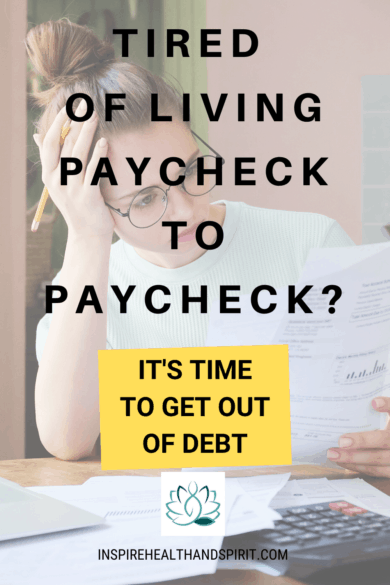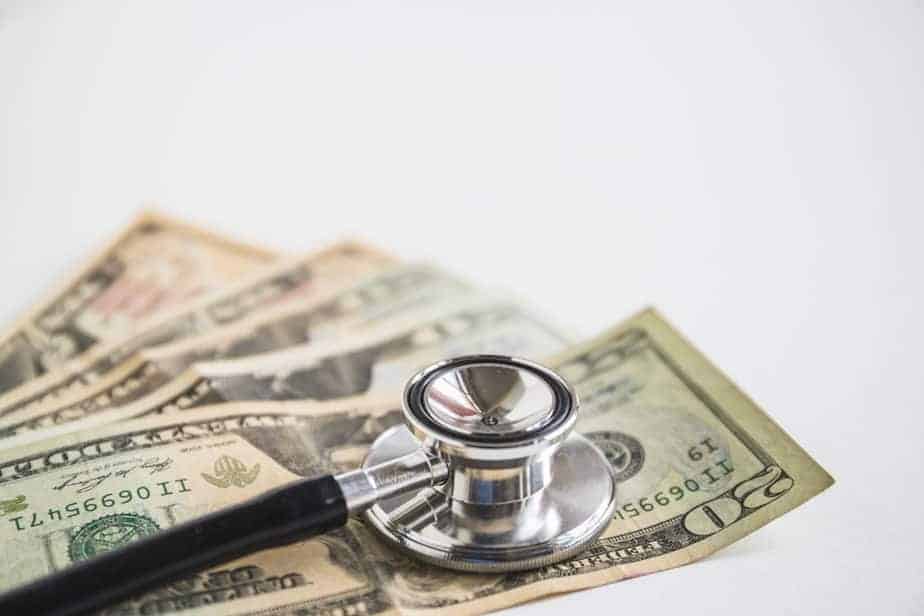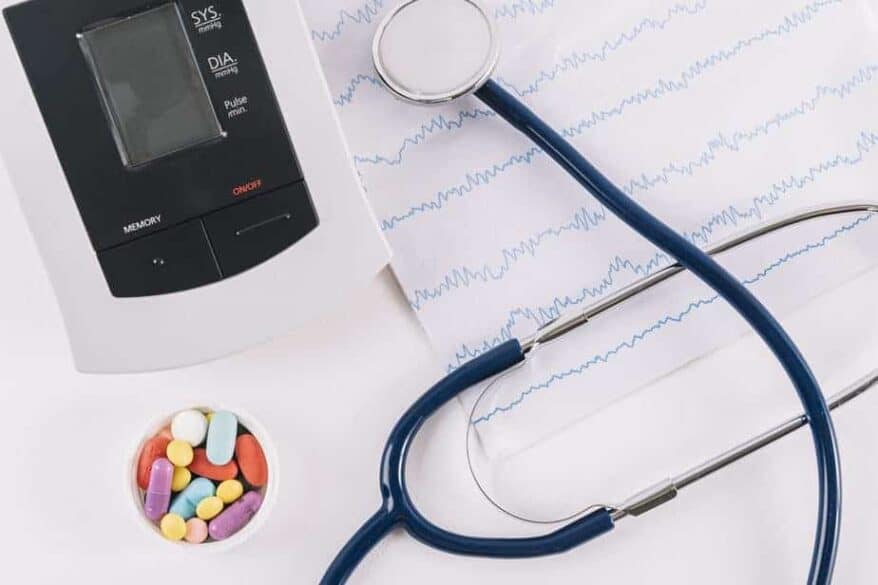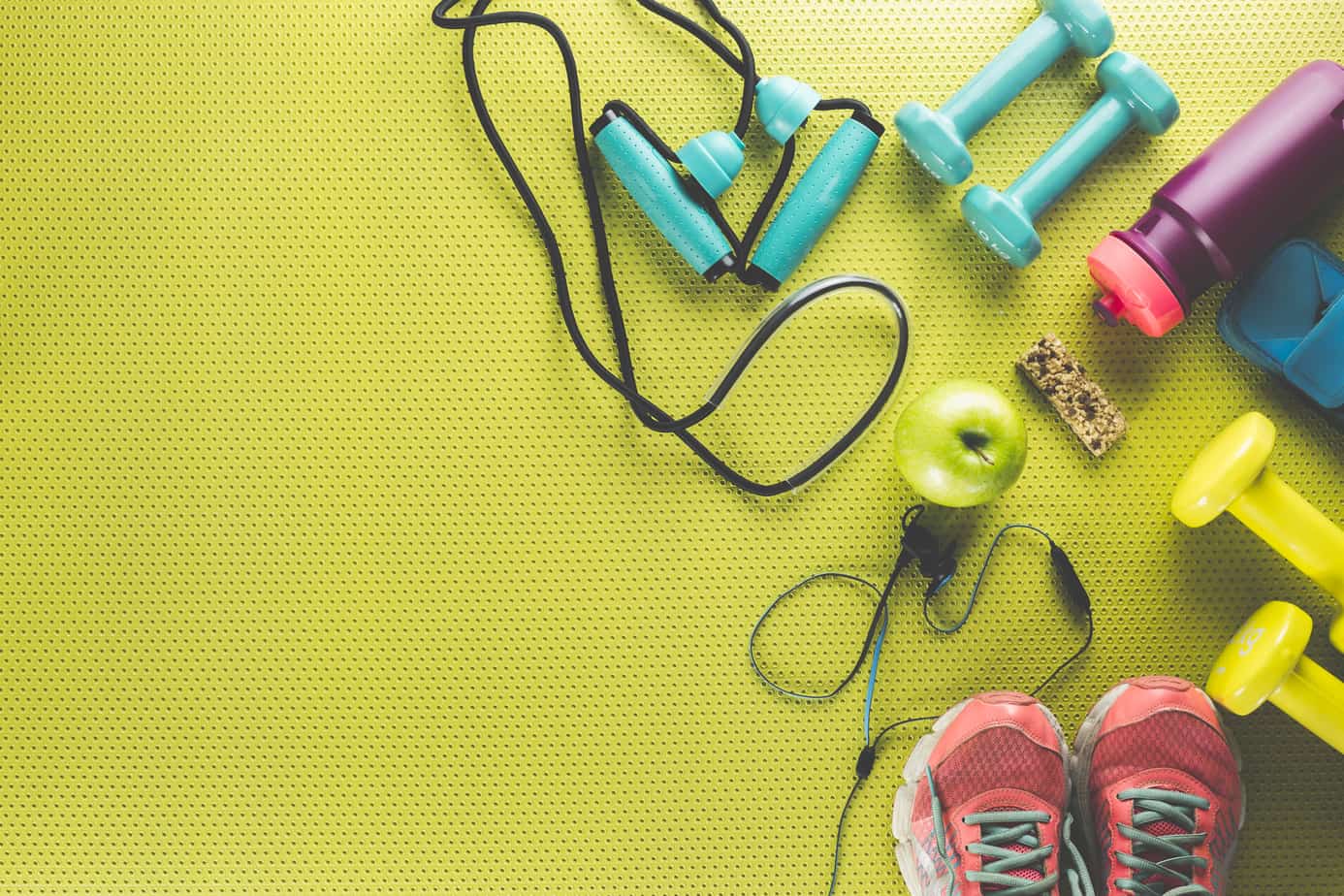Financial wellness is beyond what you have in your portfolio. We’re talking about your financial wellness regarding debt. And how it can cause health issues like anxiety and stress, not to mention hindering emotional and mental wellness.
You know what I’m talking about the stress of paying all your bills with your next check. Credit card bills that are due one right after the other wiping out your bank account. Not to mention the rent/mortgage payment due at the beginning of the month and your car payment that takes up big chunks of your check.
Then just like that, your entire paycheck is gone. Now you’re stressed and hope nothing comes up that requires any money or payments. Those unexpected school field trips or fees for extracurricular activities.
You do your best to budget or plan for expenses, but inevitably something happens, and there are unexpected expenses. You worry and struggle ever to get ahead. Is it even possible?
There is hope.
Financial wellness is about living without worry, stress, anxiety, or fear of the unknown when it comes to your money. To live without feeling like your drowning in debt.
You’re finally tired of being sick and tired and broke. You’re not alone, even if you feel like you are 8 out of 10 people are living paycheck to paycheck and struggling like you.
Some people hide the stress of money well from others and sometimes themselves. Others live in denial about their debt or financial wellness. Don’t be fooled into thinking all your Facebook friends or Instagram followers are living this wealthy life. Most of them aren’t.
Financial wellness starts when you are ready to face your debt and begin your financial journey. That’s the first step.
The next step is being honest with yourself and significant others about the debt you’ve accrued. That means to break it down on a spreadsheet of all consumer debt; this includes credit cards, medical bills, loans, including student loans, car loans. Your house or mortgage will be one of the last things you pay off.
The plan I’m talking about is Dave Ramsey’s Debt snowball method. His debt snowball method using baby steps will get you completely out of debt while building wealth.
Who doesn’t want to build wealth?? The fastest way to do that is to pay off your debt first.
His book is 3.99 for his Total Money Makeover audiobook for a limited time, at the time of this post. The book is a great jumping-off point to learn about the baby steps and how to get yourself started. (I’m not an affiliate, but I am a user of his process).
Financial wellness may seem impossible if you were furloughed or let go due to closures or are taking a pay cut. Either way, your income is less than before this pandemic.
You may not be able to see how you can focus on getting out of debt right now, but you can ensure you don’t go further into debt. A budget will be your best friend not only during this time but the course of this journey.
The budget is what helps you to see where your money is going but also for you to tell your money where it’s going, rather than spending money without planning. Anything leftover will go to paying off your debt. You’ll be surprised that you’ll have some money left over in your budget.
The baby steps consist of 7 baby steps. They’re called baby steps because you’ll take each step slowly, especially baby step 2, where you work on paying off debt. This tends to be the longest step, as it takes time to pay off your debt.
Will this be easy to get through? Probably not. As I mentioned, this is a financial journey, which would imply there will be some hard times. Times when you want to quit or get frustrated or even angry with yourself for getting into this mess, to begin with.
If anything positive is to come out of this COVID-19 pandemic for me, it has to be realizing we don’t need some things. We really can do without certain things. This pandemic has helped me reflect on what is truly important.
Being in a place of having less money coming in has proven to give me more determination that I will get myself out of debt once and for all. If all the bills you had to pay right now were food, energy, gas, and other utility bills, how much more money would you have? Think how much less worried and stressed you’d be right now.
Bills like car payments, student loans, personal loans, credit cards, and medical bills are part of baby step 2. If that were all paid off, you would be able to stomach these times with less income. If that’s not motivation, I don’t know what is!
The Baby Steps
Baby Step 1 – Save $1000 for an emergency fund
Sure, this may not seem like enough for an emergency fund, but this is only for the short term while you pay off debt. You’ll build a 3-6 month fully-funded emergency fund in step 3. This $1000 is a cushion should something happen. This will keep you from creating more debt to pay for an emergency using a credit card.
Baby Step 2 – Pay Off All Debt
Yup, that’s right, all debt except your house. Debt includes credit cards, student loans, medical bills, personal loans, car loans, and whatever else you may owe. Even if you owe family or friends money, add this to the list. Won’t that be a relief not to owe your family anymore?
You’ll pay these debts off in order of smallest to largest. Don’t worry about the interest rates. The point here is to make progress quickly to keep you motivated and seeing results.
Pay the smallest debt first, and make minimum payments on everything else. Then use that monthly debt payment you were paying and roll it into your next debt payment. You’ll keep rolling over that amount over to the next debt. Thus, making a debt snowball.
Baby Step 3 – Save 3-6 months of emergency fund
Take your newfound money from paying off all your debt and build an emergency fund. This is 3-6 months’ worth of your living expenses, which at this point will be your basic bills and mortgage/rent.
Baby Step 4 – Invest 15% of your income in retirement
Be sure to finish step 3 before moving on to this step. This is the step to start building your wealth. Everything takes work and effort, including building wealth. Invest in tax-favored accounts.
Baby Step 5 – Save for kids college fund
If you have kids, you know the stress of thinking about how you will pay for college. Rather than setting your kid(s) up for student loans or debt, set them up for success by starting a college fund. Dave recommends using a 529 plan or ESA (education savings account).
Don’t have kids? Then you can skip this step and move on to step 6.
Baby Step 6 – Pay Off your House
That’s a big one, right? By this point, you should be able to pay off your house quickly. By quickly, I mean faster than that 30-year fixed mortgage plan you’re on. It may take 1-2 years or maybe five years. Still, that is a lot faster than 30 years.
Think of all the money you’ll have in your bank account after this is paid off! I’m not at this step yet, but I dream of this one day. No mortgage payment, we would have so much more money!
Baby Step 7 – Build wealth and give
You made it!! You’re completely and totally debt free!! Can you imagine? I can, and that’s why we’re working our steps to get there. Continue to build your wealth and give back.
As Dave says
Do you know what people with no debt and no payments do? Anything they want!
Dave Ramsey
This is the step you’ve worked hard, sacrificed, worked overtime for, and did without for so long. To do whatever you want and pay for it in cash. No more debt!
The goal here is to stay out of debt for good. No sliding back and charging credit cards. Dave recommends cutting up credit cards in baby step 2. But, I leave that up to you. Don’t use them, though, or you’ll only be back in this same boat.
I cut up my cards, but the hardest is my Amex which I’m still paying on. This has always been the card that I carried in my wallet. It was my backup payment. But I have since removed it and filed it away. It is next on our debt snowball and will be paid off soon!
As I mentioned, I’m working on these steps too. So I can say I can relate with you that it will be hard, in the beginning, to get rolling down that hill, but once you pay off that first balance, it’ll motivate you to keep going.
My Recommendations and Tips
My recommendation on step 2, which for most of you will last the longest, is to only focus on one debt account or credit card at a time. It’s easy to look to the future and see how much you owe on all your accounts and get overwhelmed. Leading you to give up and not stick to your budget.
I’ve done it myself. And I have to tell myself to focus on the next balance and get that paid off. When you do that, you see your efforts paying off, and you stay motivated.
Another recommendation is to budget or plan out your expenses to the dollar, which includes all your monthly payments, mortgage, utility bills, groceries, gas for your car, car payment, Hulu and Netflix subscriptions, Target budget…everything. Once all your income has been budgeted for said categories, the remaining amount that is not allotted to an expense will go to your first debt.
That means you’ll be giving some stuff up, like eating out. That’s a big one for my family. Think of it this way, that $50 or $100 could go to pay off a bill faster. Or be gone in the blink of an eye once dinner is over.
Your budget will need adjustments every month. We have some expenses that don’t happen every month and don’t need to be in every monthly budget. Also, this is a great time to review what bills or services you can do to free up some money to pay off your debt faster. Every little bit helps. Do you need every app subscription, and cable tv (make the switch we did this four years ago, and don’t even miss it)?
I prefer a spreadsheet for my budget, and I review this every week. Now, I check what has cleared our bank and what is still pending and balance everything.
Yup, like the good ol’ days of balancing your checkbook. You have to pay attention to every little charge hitting your account. No surprises. Those surprises will screw up your budget.
Another recommendation for my Amazon Prime lovers that’s me; this one was hard to do, but I recommend it. Are your charges for Amazon purchases going to a credit card? If so, delete all payment methods that are credit cards and leave only your checking account.
So next time you order anything, you’ll have to think, do we need this? Do we have the money to pay cash for it right now? Did I budget for this? If not, you’ll have to skip it—no easy one-click payments anymore, which lets you skip the financial thinking of your purchase.
Tip – Remove the Temptation
Remove credit cards from PayPal/Venmo for online purchases. I did this and found it helpful not to make late-night purchases from my bed when I can’t sleep. That gets me every time. You’ll have to get out of bed or off the couch to get your card out to pay anything. Most of the time, if you’re like me, I’d rather not get up, so never mind.
You gotta find your weakness in purchasing junk that you don’t need. And trick yourself into not making these automated purchases. Your goal is not to charge up any balances on the credit cards you’re paying off. That defeats your purpose and hard work. I’ve been there.
Tip – Remove the Email Marketing Temptation
You know all those emails you get every day from all your favorite retailers? Well, those are temptations that make it hard to pass up those special offers like 10% Off your next pair of shoes or whatever it may be. Make the bold move to unsubscribe from those emails. These emails are designed to make you spend your hard-earned money.
Those retailers don’t care about your financial wellness. They want you to buy their product, which can set you back in your progress. I know it’s tough, but it’s worth it.
Don’t worry. You can always subscribe again when you have the cash flow to buy whatever you want without any worry.
My recommendation is to stay focused. Listen to Dave Ramsey on the podcast, YouTube, SiriusXM, or through his Financial Peace University daily. Yes, every day or just about because you’ll need to hear other people going through what you are going through and know you are not alone. You’ll learn to think like Dave and make better financial decisions to build your wealth.
I listen to him every day while picking up kids from school in the afternoon. Other times I listen to the podcast. Listening to these stories keeps you motivated and keeps you on your course.
You hear other people doing their debt-free screams. Yes, it’s a thing.
That’s when you know you can do it and keep on keeping on. And sometimes you hear people who are worse off than you are or are hundreds of thousands of dollars in debt. I heard one that paid off over $600K in 5 years! Wow, if they can do it, I can do it.
Recommended reading Stop Making the Same Money Mistakes Over and Over, and Seven Money Tips to Quit Doing. You can also see how Minimalism can help you on your financial journey.
You can do the Dave-ish plan, but that won’t get you out of debt any faster. Doing what you think is the best to pay off debt isn’t going to work, or else you wouldn’t be in this mess, to begin with.
So friends, during this time of uncertainty, let this be an opportunity to change your life. Change the way you’re living, paycheck to paycheck.
Maybe, you’re not able to start the steps right now. But you can promise yourself to start and get a handle on your finances once we resume normalcy. There is light at the end of the tunnel.
You’ll have to make an effort and sacrifice to make the changes, but it will be worth it in the end. Think about not having that house payment anymore and stay focused.
If you’re not working due to the coronavirus or cannot make ends meet, please focus on your four walls first. These are your necessities. Focus only on Food; Utilities; Shelter; Transportation. Listen to Dave; speak about the four walls on YouTube. The goal here is to get you stable and able to start baby step one.
I’ll keep you posted on our baby steps’ progress as we get to each step. We’re still working on step 2 and plowing through those debts. Our largest is student loans, but for now, we’re working out debts from smallest to largest.
Friends, I wish you peace and guidance on your financial journey. Take care and be well.
UPDATE 3/12/21
I realize that Dave Ramsey’s approach may not be for everyone. You may need to find the right fit for you to stick with your get out of debt plan. Over the years, I’ve also read books and watched shows by other financial experts. A few of them are listed below.
Tony Robbins – Money Master the Game
Gail Vaz-Oxlade – Canadian television series – Til Debt Do Us Part, Princess and, Money Moron. I watched her shows years back and loved her. She has since retired so you won’t find new content but the old stuff still applies. Check her out on Prime or read one of her many books like Debt-Free Forever: Take Control of Your Money and Your Life.
Suze Orman – The Money Book for the Young, Fabulous & Broke, Women & Money: Owning the Power to Control Your Destiny, plus her show and many other books but these are the only two I’ve read and can recommend.






This blog post has assisted me more in making conscious decision relating to my financial affairs. I have bookmark it for future reference. I like the idea that it enforces especially the subject of credit card debt as I myself often find myself crippled by credit card debts and payments. Thanks for this informative and helpful article. Love it.
Thank you so much for this positive feedback. It means a lot that I’m able to offer some help on your financial journey. We have all struggled at some point financially. Keep with your goals!